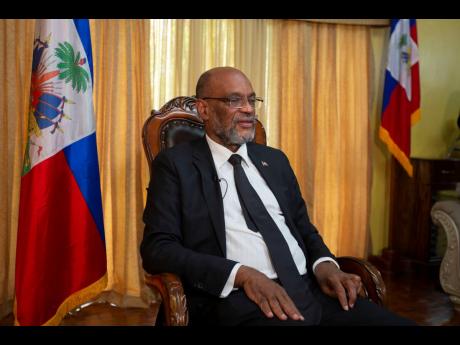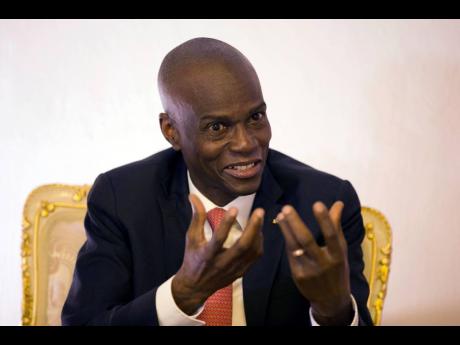‘No judge has charged me’
Haitian PM denies role in Moïse murder plot; suspect held in Ja returns to court this week
There were at least a dozen telephone calls between Haiti’s Prime Minister Ariel Henry and one of the accused masterminds behind the assassination of President Jovenel Moïse, a report seen by The Sunday Gleaner has charged.
Henry was not head of government at the time.
Two of those telephone conversations with Joseph Felix Badio took place in the hours after Moïse’s brutal slaying on July 7 last year, the Réseau National de défense des droits de l’homme (National Human Rights Defense Network, RNDDH) in Haiti charged in the leaked report.
Badio has been accused by Haitian authorities of “coordinating the assassination” and remains on the run, despite a warrant for his arrest.
It is alleged that following the assassination, Badio entered Moïse’s private residence and took away documents, a large sum of money and the weapons of the police personnel who were at the scene.
John Joel Joseph – the former Haitian senator and accused assassination plotter now being held in a Jamaican high-security prison – was also listed among five public officials Badio telephoned within an hour of Moïse’s death.
Joseph’s alleged role in the plot was to make cash payments for the rented vehicles used during the assassination, the report said.
The RNDDH claimed Joseph was spirited out of Haiti late last year with the “complicity” of well-connected individuals at the national palace.
A high-ranking Jamaican police official confirmed that the former Haitian lawmaker was secretly residing in the quiet community of Warminster, St Elizabeth, since “September-October last year”.
The senior cop said investigations revealed that Joseph paid contacts in the guns-for-drugs trade approximately US$12,000 to transport him and his family to Jamaica by boat and organise their living arrangements.
“It is not difficult to get a boat from Haiti to Jamaica. It’s a much bigger network than you would think,” the cop told The Sunday Gleaner.
Joseph is scheduled to appear before the Jamaican courts on Tuesday.
THOUSANDS OF TELEPHONE CALLS
The RNDDH, a non-governmental organisation, said its attention was “particularly drawn” by the thousands of telephone calls made between “persons indexed in the preparation and commission of this assassination”.
“While the current Prime Minister Ariel Henry claims to have forgotten the contents of his discussions with Joseph Félix Badio, it should be noted that they met at least 12 times,” read the 11-page document, citing phone records perused by investigators.
“The last two calls were made between them the night of the murder.”
But Henry has pushed back at the allegation, which coincides with claims in a report by American news network CNN that he was not only involved in the planning of the assassination, but has been helping to frustrate the probe.
A senior adviser to Henry poured cold water on the claims in the RNDDH report, asserting that Badio had provided a letter indicating that many of the phone numbers attributed to him were “dysfunctional for months”.
“There is no serious case. All are rumours, from right to left,” the adviser insisted during an interview with The Sunday Gleaner last week.
The Haitian prime minister also used a news conference on Friday to defend himself against what he described as “political machinations”.
“They come from the same laboratory,” he said referring to the report by CNN and another by the New York Times newspaper.
“I am not involved in the assassination of Jovenel Moïse,” Henry declared, adding that “no judge has accused or charged me”.
The allegations could muddle what has been described as a “floundering” investigation into Moïse’s July 7 assassination.
The Haitian president was shot, stabbed and beaten to death inside his private residence by a group of heavily armed mercenaries on the instructions of several masterminds, the probe has so far revealed.
His wife, Martine, was also shot in the incident, but survived.
Thirty-nine suspects, most of whom were apprehended in the days after the assassination, remain in police custody without any criminal charges.
Colombian military officer
Another suspect who fled to Jamaica, former Colombian military officer Mario Antonio Palacios Palacios, was held in Jamaica on illegal entry charges last October and deported to his homeland last month. He was, however, intercepted in Panama by American law-enforcement agents and taken to the US, where he is now facing several criminal charges for his alleged involvement in the killing.
But seven months after Haiti’s latest assassination, the human rights group has flagged a number of issues it fears could compromise the probe.
Among them, the group claimed, was a failure to extend the investigation to the banking institutions which “hosted accounts that had agreed to transactions to pay the murderers of Jovenel Moïse”.
It claimed, too, that the Central Directorate of the Judicial Police no longer has access to the databases of key state entities, including the Directorate of Immigration, and demanded clarification “because this sudden prohibition hinders the smooth running of the judicial investigation”, the report said.
It also raised corruption concerns about the judge leading the probe, pointing to allegations that his clerk promised to void an arrest warrant issued for the owner of a car-rental company implicated in the plot if the owner agreed to transfer a vehicle in the clerk’s name.
“Today, six months after this assassination, the judicial investigation is floundering, with no intention of finding all the guilty and bringing them before the court,” the RNDDH lamented.


